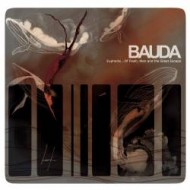 The moments when man places his own needs above those of the natural world might be described as blots on our historical landscape. César Marquez, a conceptual artist, master of multi-instrumentalism and the man behind Bauda from Santiago in Chile, seems fascinated by the subject and appears keen to sculpt his band’s music around these blots. Bauda’s 2009 debut album, Oniirica, attacked the generalized, nightmarish and “devastated contemporary life” we have created, using eclectic instrumentation such as flute, accordion and even didgeridoo. For Euphoria… the general theme remains but the band has honed in on a specific moment in time. Here, they attempt to whisk us back to the 40s, 50s and early 60s when Chile’s Quintay Whaling Station was active and killing up to 16 whales per day.
The moments when man places his own needs above those of the natural world might be described as blots on our historical landscape. César Marquez, a conceptual artist, master of multi-instrumentalism and the man behind Bauda from Santiago in Chile, seems fascinated by the subject and appears keen to sculpt his band’s music around these blots. Bauda’s 2009 debut album, Oniirica, attacked the generalized, nightmarish and “devastated contemporary life” we have created, using eclectic instrumentation such as flute, accordion and even didgeridoo. For Euphoria… the general theme remains but the band has honed in on a specific moment in time. Here, they attempt to whisk us back to the 40s, 50s and early 60s when Chile’s Quintay Whaling Station was active and killing up to 16 whales per day.
By aurally soaking us in the raw emotions of the place, they explore the depths and join hands with the workforce as they hunt, harpoon their targets and float the mighty beasts to the surface to be harvested; their carcasses left to rot. Naturally, the miasma of moods that they need to generate means you’d find it hard to pigeon-hole them and their music is quite happy genre-hopping about, even mid-song, so you’ll need to expect the unexpected.
From the off we are sunk beneath the surface to the “Ghosts Of Phantalassa” (a probable reference to the vast ocean of Panthalassa that once existed) where wood-splitting samples, oddly sounding like a rustling box of popcorn, tighten themselves up to form a crunched rhythm. Warbling keyboards and haunting vocals surround it to form a dreary, doom-laden kind of shoegaze that sadly ditches its talent all too early.
“Silhouettes”, the soul of the piece, portrays the whaler’s conflicted mind as first he sights the creatures and marvels at their beauty, the music pitching forth a catchy, uplifting lyrical sweep, then bails on us as thoughts turn to darker deeds. As you float through you’ll catch hints of Mastodon’s cosmic-prog interwoven with the darkly, shifting purpose of Lantlôs, the haunting cleans of Alcest and even the rimshots and palm-muted picking that is so evocative of instrumental post-rockers like Pelican and Russian Circles. There are even traits of Opeth in the acoustic guitar that marks out the wonderfully stripped-back “Crepuscular”.
Without doubt, the lack of shape or form is intentional, but this inevitably results in some confusing moments. You may find, like I did, that your own personal journey through the concept will delight and frustrate you in equal measure. The lack of clarity and an over-reliance on gimmicks (take the disorienting speaker-to-speaker shifting that lurks in “Acension”) over structure means the project feels all too flabby.
Despite their determination to give you the running-time to sink into their moods, they have a tendency to repeat the dullest of riffs and chord cycles which eventually result in the tracks overstaying their welcome. Some ham-fisted attempts to counteract this can be found as they opt for cringing key changes or sharp drops in pace; moments where spiked aggression suddenly morphs into twinkling dreampop. All these are vague attempts to break the blandness, but often result in confusion and a total abandonment of atmosphere. However, there are moments where it all clicks into place, demanding repeated plays. Moments like the sublimely chaotic, endorphin-loaded headrush of “Humanimals” climax, the murky trickery that lurks in “Oceania” or the uplifting wash of “The Great Escape”.
If you have the time and the patience, Bauda have the tools to shift your perceptions of what you thought possible. They refuse to choose the option to sit and fester, instead choosing to determinedly hunt down the sublime, minding not when they harpoon the ridiculous. My dull brain may struggle to keep up with all this motion in the ocean, but Bauda should still be roundly applauded for their efforts.
(6/10 John Skibeat)

Leave a Reply